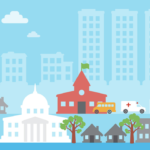You’ve Got the Power:
We live in a finite world – there are only so many hours in the day, so much money in your bank account, and so many glasses of wine I can drink. Why then is it that we use precious natural commodities like there’s an endless supply for us to take from?
Many signs point to a growing need to address wise and sustainable management of natural resources, setting before us a fundamental and important challenge. As the age of digital revolution unfolds, we’re presented with innovative technologies to solve for these challenges, yet at the same time, a new set of hurdles is added to the mix. In order to reach mutually beneficial outcomes, public and private organizations, individuals, and communities will need to coordinate approaches in order to provide a sustainable framework toward improved environmental outcomes.
Success Stories:
So how will we get there, how will we usher in a new, improved way to powering and sustaining our communities? Key enablers of these changes will be technology innovations around the Internet of Things (IoT), software, data analytics and the digital-ready network, all which will pull data from city edge devices into the cloud for greater insight and management.
Let’s use Adelaide in South Australia for example. The city piloted a smart lighting deployment of 60 light poles, launching publicly in April earlier this year. The Adelaide Smart City project already boasts significant energy savings with an impact on carbon reduction, moving them closer to their goal of becoming the world’s first carbon neutral city.
Which tree in the park needs water? How can we reduce carbon emissions? And why empty garbage containers that are only half full? It is questions like these that cities all over the world face. And today, Copenhagen, the capital of Denmark, is moving closer to finding answers using sensors and data from intelligent devices that connect everything from sewers, to light poles, bike lanes, and trees. Denmark is finding that it can proactively manage water output for its citywide greenery, reduce energy consumption by ensuring that outdoor lighting follows the ebb and flow of city life, and monitor air quality to fight toxic pollution around the city.
Ultimately, talking endlessly about the latest and greatest technology in smart city innovation is totally exciting for my inner nerd. The true importance, however, lies with the impact that something like energy or resource management can bring to communities around the world. Yes, topics of cool start-ups and business disruption are all the rage. But stories of taking on and defeating climate change issues, balancing socioeconomic inequalities, and helping victims of geopolitical fallout steal the show.
Next Up in #TransformationThursday Series:
Stay tuned for next week’s post to discover how innovation is truly changing the world. And be sure to check back each week as we discuss digital transformation in cities, detailing storylines and examples with various social, environmental and economic outcomes.
We’d also love for you to be a part of the conversation by using the hashtag #TransformationThursday and by following @CiscoGovt on Twitter.
And for more information and additional examples, visit our smart cities on Cisco.com.


CONNECT WITH US